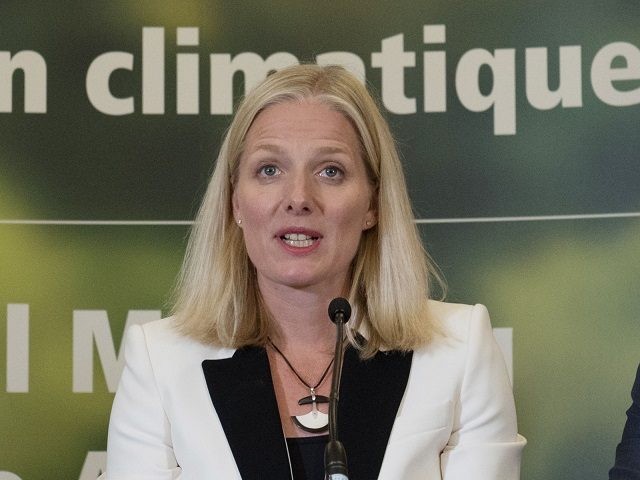“The science is clear. Canada is warming faster than the rest of the world from human-caused climate change,” said Canada’s Minister of Environment and Climate Change, Catherine McKenna, in a Wednesday morning tweet.
Canada’s disproportionate warming “is an alarming reminder of the need to take real action and continue fighting climate change. We can, we must, and we will,” Ms. McKenna said.
McKenna, affectionately known as “Climate Barbie,” was referencing a claim by the World Economic Forum that “Canada is warming twice as fast as the rest of the world.”
One might be tempted to think that a little warming might do Canada some good.
In McKenna’s hometown of Hamilton, Ontario, the average temperature during March 2019 was below freezing (-1.3º C or 29.7º F). The daily average maximum temperature during the month was 3.5º C (38.3º F), while the average minimum temperature during the same period was -6.2º C (20.8º F).
In Ottawa, Ms. McKenna’s current home, temperatures were even colder. The average for the month was well below freezing at -4.2º C (24.4º F), while the average daily high was just 0.7º C (33.3º F) and the average daily low for the month was -9º C (15.8º F).
Ms. McKenna’s constituents can rest assured that she is bound and determined to keep Canada cold.
The Climate Change Minister is taking heat, however, for her decision to award $12 million in funding to Loblaw, Canada’s largest food retailer, so it can cut carbon dioxide emissions by installing more energy-efficient refrigerators.
On Tuesday, critics asked why Ms. McKenna chose to subsidize Loblaw, a firm with annual net earnings of some $800 million that has confessed to a 14-year price-fixing scheme for bread and last year received a court order to pay back taxes of around $368 million related to a banking subsidiary in the Caribbean.
“We have a climate plan that works with everyone. It works with large businesses, small businesses, cities, schools, hospitals, municipalities,” McKenna said.
“Loblaw was one of the 50 winners through the competitive process. Why? Because they can get the most significant emission reductions,” she said.
Last October, McKenna famously confused the issue of air pollution with the emission of greenhouse gases such as CO2. Air pollution is generally measured in the concentration of fine particulate matter in the air, leading to a multitude of serious health problems.
According to a 2018 report by the World Health Organization (WHO), “around 7 million people die every year from exposure to fine particles in polluted air that penetrate deep into the lungs and cardiovascular system, causing diseases including stroke, heart disease, lung cancer, chronic obstructive pulmonary diseases and respiratory infections, including pneumonia.”
The WHO database analyzes annual mean concentrations of fine particulate matter, noting that those that pose “the greatest risks to human health” are sulfate, nitrates, and black carbon.
Significantly, the report made no mention of “climate change” and spoke only of the adverse health effects of polluted air, an unrelated phenomenon.
All of the potentially fatal pathologies mentioned in the report are caused by “exposure to fine particles in polluted air” and not by global warming, much less exposure to carbon dioxide.
Unlike pollutants — foreign substances that contaminate air, water, or land — carbon dioxide is odorless, colorless, and most importantly, non-toxic. It is an essential component of air, not a pollutant of air.
Human beings expel carbon dioxide with every breath they take (without polluting) and breathe it in with every lungful of air they inhale.
Ms. McKenna is not alone in her climate confusion, however. Canadian finance minister Bill Morneau has made the same mistake, referring to CO2 emissions as “carbon pollution.”
So what of the latest warming scare?
If Canada is truly warming at twice the pace of the rest of the globe, one could be forgiven for suspecting that all the hot air proceeding from Ottawa might have something to do with it.
Follow Thomas D. Williams on Twitter Follow @tdwilliamsrome

COMMENTS
Please let us know if you're having issues with commenting.